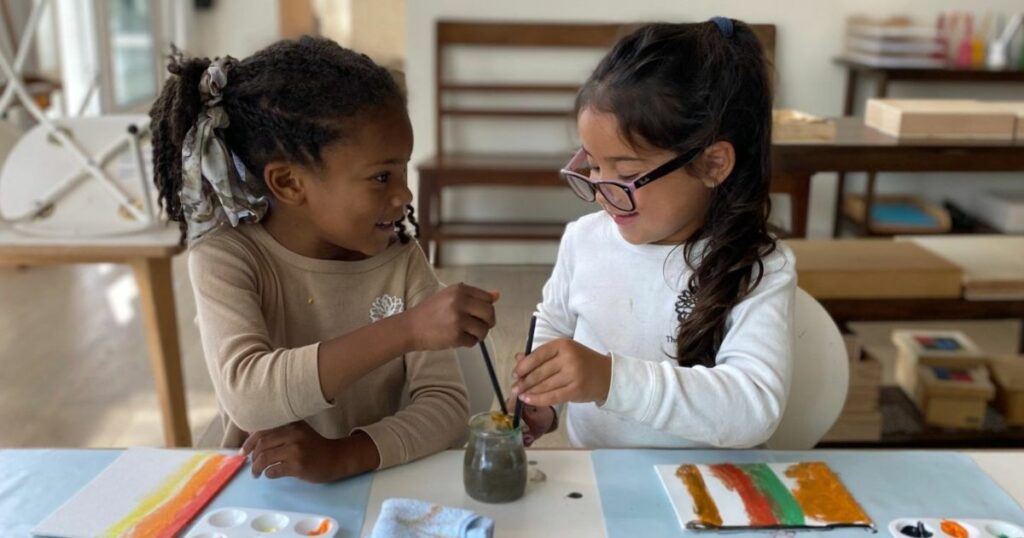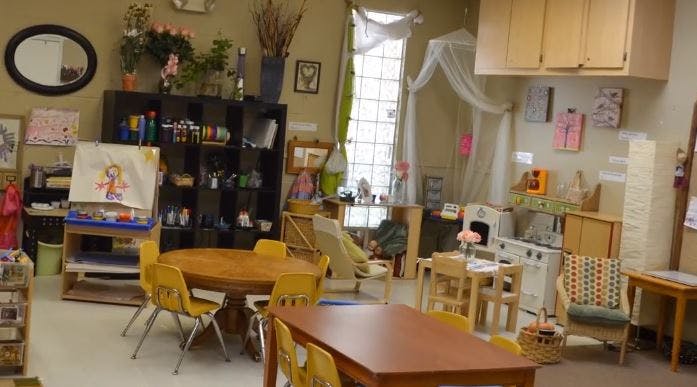Introduction: Tailoring Education for Each Child
The Montessori approach is a unique method of education that prioritizes personalized learning in an environment where children of different ages can excel. This innovative philosophy is founded on a deep understanding of child development and a strong focus on promoting independence and creativity. The Montessori Method goes beyond traditional teaching methods and has revolutionized the way we perceive and approach education for children. Dr. Maria Montessori pioneered this approach, which emphasizes self-directed learning, hands-on experiences, and a natural passion for exploration and development.
Infants and Toddlers: Nurturing the Seeds of Independence
-
Sensory Exploration: The cognitive development of children is highly dependent on their ability to explore the world using their senses. Infants and toddlers, in particular, rely on touch, taste, smell, sight, and hearing to learn and discover during their early years. Therefore, sensory exploration is a crucial aspect of their growth and development. Montessori classrooms recognize this need and offer a variety of sensory-rich activities that promote learning and discovery among children. By engaging in these activities, children can expand their cognitive abilities and develop important skills that will benefit them throughout their lives.
-
Motor Skills Development: Young children acquire important motor skills by playing with objects and being active, both of which are encouraged in a Montessori classroom designed specifically for infants and toddlers. The space is created to be safe, stimulating, and easily accessible, with child-sized furniture and materials positioned at the child’s level to encourage independent exploration. Unlike traditional teachers, Montessori educators serve as guides, carefully observing each child’s unique interests and developmental progress to provide tailored support and appropriate learning materials.
-
Language Acquisition: During the formative years of a child’s development, the role of caregivers is crucial in shaping their ability to communicate effectively. To create a language-rich environment, many parents and educators have turned to the Montessori approach. This method involves a variety of communication tools, including conversations, singing, and storytelling, which encourage children to express themselves more freely. By utilizing these techniques, children can build their communication skills and establish a strong foundation for future social interactions. This approach is highly effective and has been embraced by many experts in child development.
Preschool Age: Cultivating Curiosity and Confidence
Ages three to six mark a critical period in a child’s development. Montessori preschool classrooms offer:
- Practical Life Activities: The exercises that are presented here are skillfully designed to enable individuals to improve their ability to care for themselves, while also enhancing coordination and concentration skills. The activities themselves are specifically crafted to enhance fine motor skills, with tracing, cutting, and sorting exercises that are geared towards promoting hand-eye coordination – a crucial skill for success in both writing and academics. For preschool-aged individuals, these exercises also provide opportunities to choose their activities, which helps to foster a sense of autonomy, competence, and confidence. Additionally, completing tasks independently allows individuals to further develop their self-esteem and sense of capability.
- Sensorial Materials: At this particular developmental stage, children are introduced to the fundamental skills of classifying and organizing the world around them. This process stimulates their senses, allowing them to progress from concrete experiences to more abstract concepts. To facilitate this, Montessori materials such as the Pink Tower and Sandpaper Letters are employed, encouraging hands-on learning that effectively bridges the gap between the tangible and the abstract. In addition, language development is enriched through storytelling, conversations, and labeling of objects. Through this holistic approach, children learn to associate symbols with sounds and words, laying the foundation for the acquisition of reading and writing skills.
- Academic Foundations: Introducing children to the principles of mathematics, language, science, and culture during their early developmental years can significantly enhance their intellectual growth. Utilizing interactive materials and tools, youngsters can effectively master key concepts such as numbers, shapes, and patterns, laying a strong foundation for their future mathematical comprehension. In this context, the teacher assumes the role of a facilitator, providing guidance and support to the learning process rather than dictating it. By offering instruction and making available a variety of materials, the teacher encourages the child to explore and discover, fostering a natural inclination towards independent discovery and learning.
Elementary Age: Building on Individual Interests
For children aged six to twelve, Montessori education takes a more in-depth and exploratory approach:
- Individualized Learning Paths: The Montessori method aims to nurture a passion for continuous learning based on each child’s interests and abilities. It acknowledges that every child is distinct and has varying capacities, interests, and learning speeds. Teachers observe and identify individual requirements, creating tailored learning experiences that align with each child’s developmental stage and curiosity. Montessori education encourages children to delve deeply into various topics, promoting critical thinking. Children learn to ask questions, analyze information, combine concepts, and assess their findings. This approach fosters an analytical mindset.
- Collaborative Projects: Montessori education prioritizes teamwork, responsibility, and problem-solving through collaborative projects. These projects are designed to foster a sense of community and cooperation among children, allowing them to delve into topics that interest them and achieve shared goals. Children engage in extensive research and exploration using a variety of resources, such as books, the Internet, field trips, and expert interviews. They learn how to gather and analyze information and synthesize their findings, cultivating essential critical thinking and problem-solving skills.
- Connection to the Real World: When lessons are connected to real-world situations, it helps children understand how academic knowledge is applied in their daily lives. This is why activities that are linked to real-world applications are essential. Trips to museums, factories, botanical gardens, and more allow children to observe and connect with the real world. These outings make abstract concepts tangible and relevant. In addition, children get to engage with real tools and materials that mimic the adult world, which provides hands-on experience and contextualizes their learning.
Adolescence: Preparing for Adulthood
The teenage years in Montessori education focus on building skills necessary for adulthood:
- Social Responsibility: Teenagers participate in a range of community projects, collaborating with local organizations and contributing to causes that matter to them. By encountering diverse cultures, political structures, and economic systems, teenagers gain insight into their responsibility as global citizens and the interdependence of the world.
- Entrepreneurial Experiences: Students are given the chance to explore real-life business projects. They are encouraged to come up with business ideas, develop a solid business plan, and devise strategies to put their concept into action. Students may also explore various ways to raise funds for their venture, such as crowdfunding or small investments from their community. They will be actively involved in all aspects of running a business, including marketing, sales, customer service, and inventory management.
- Emotional Intelligence Development: Guidance in emotional growth, self-awareness, and conflict resolution. Emotional Intelligence refers to the ability to recognize, understand, and manage one’s emotions, as well as the ability to recognize, understand, and influence the emotions of others. In the Montessori approach, EI is considered crucial for personal growth, social interaction, and academic success.Emotional Intelligence can be broken down into several key components, each of which is nurtured in the Montessori setting:
- Self-Awareness: Recognizing and understanding personal emotions and their impact.
- Self-Regulation: Managing and controlling emotions, even under stress.
- Motivation: Using emotional factors to achieve goals.
- Empathy: Understanding and sharing the emotions of others.
- Social Skills: Building and managing healthy relationships.
Conclusion: The Lifelong Impact of Montessori Education
The Montessori approach to education stands as a unique and enduring method that emphasizes individualized learning and development across various age groups. From the early nurturing of independence among infants and toddlers to the cultivation of curiosity and confidence in preschoolers, the Montessori method aligns with the natural progression of a child’s growth. As children progress to elementary age, the curriculum takes a more in-depth and exploratory approach, building on individual interests, fostering collaborative projects, and forging real-world connections. The teenage years in Montessori are focused on developing skills necessary for adulthood, including social responsibility, entrepreneurial experiences, and emotional intelligence development. Each stage is intricately designed to empower children to be self-motivated learners, capable critical thinkers, and compassionate global citizens. The Montessori model’s lasting success is evident in its holistic approach to education, creating a seamless transition across different age groups and laying a strong foundation for lifelong learning and personal growth.






